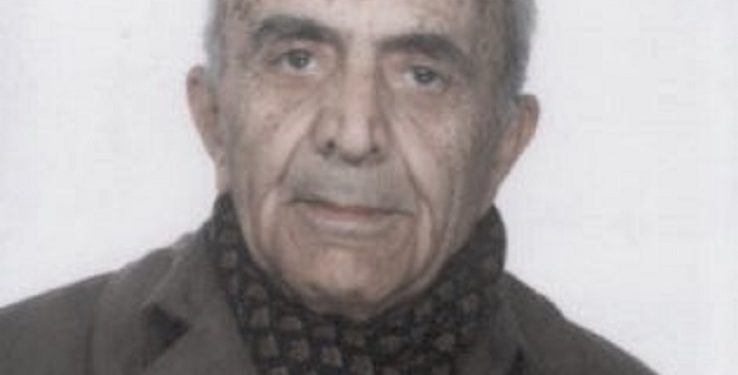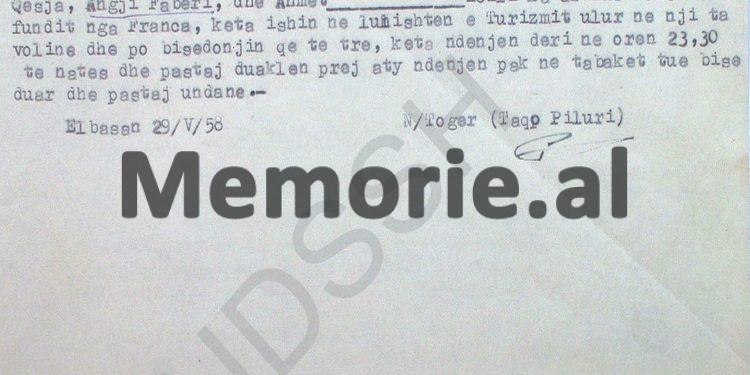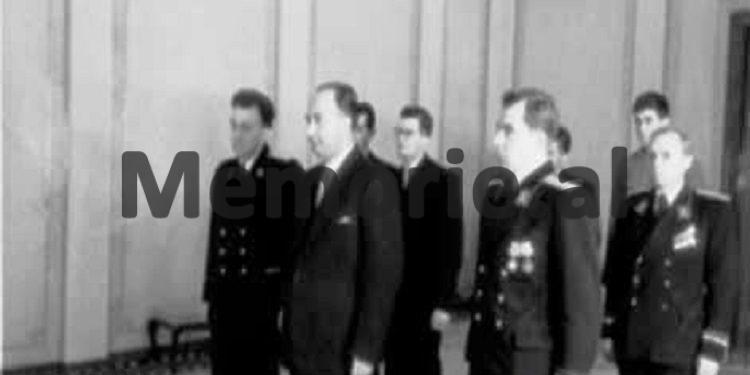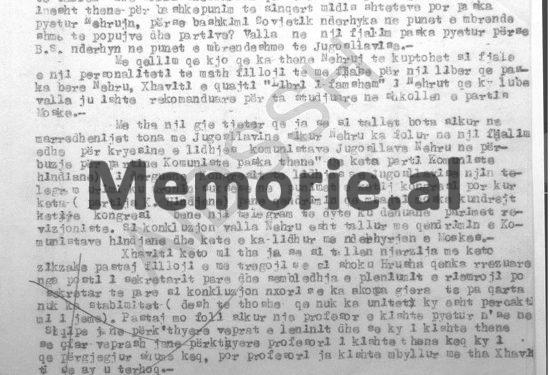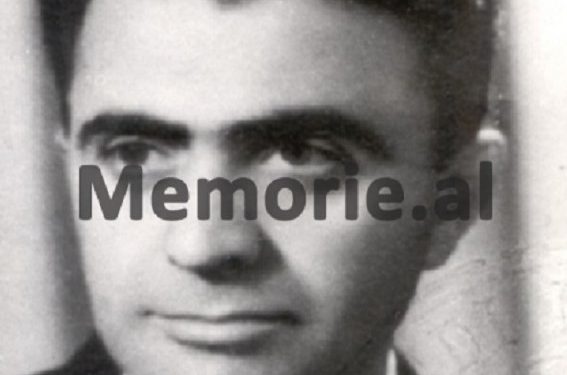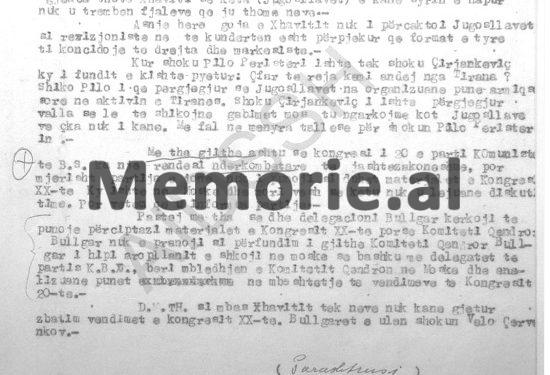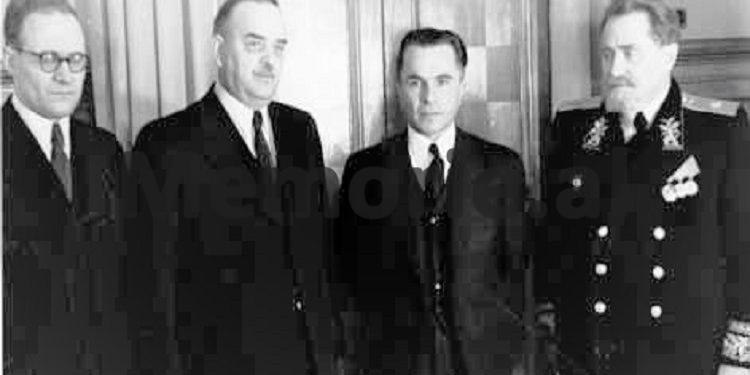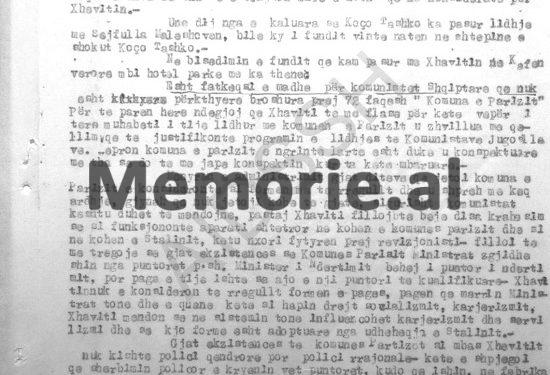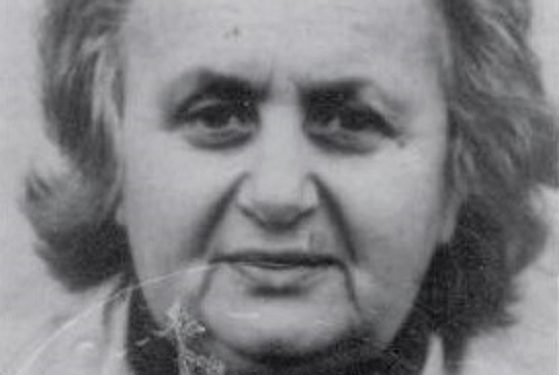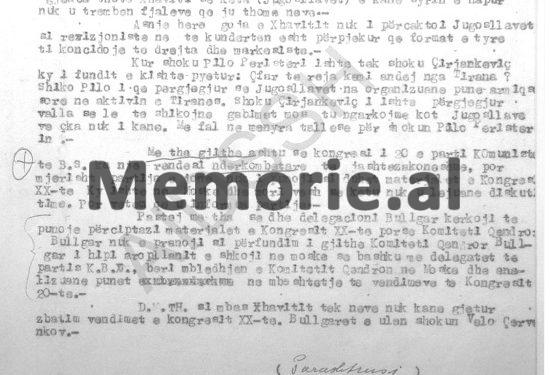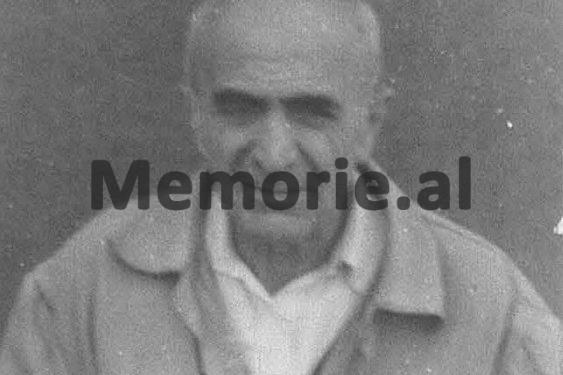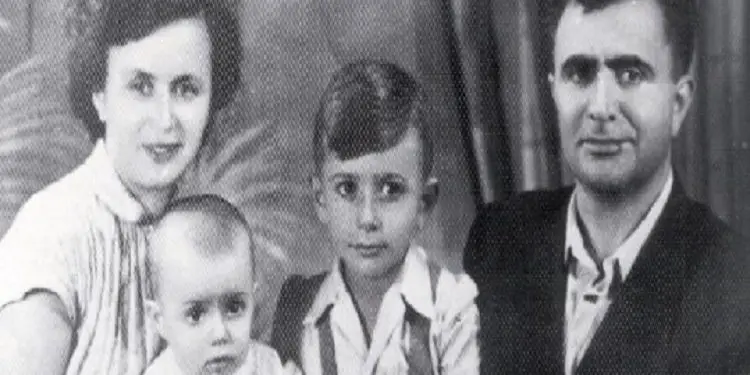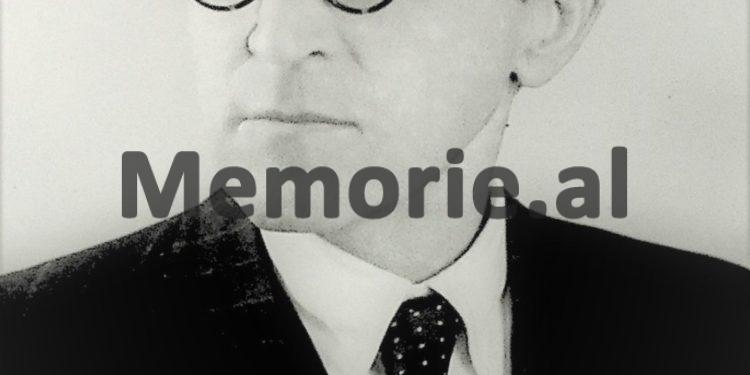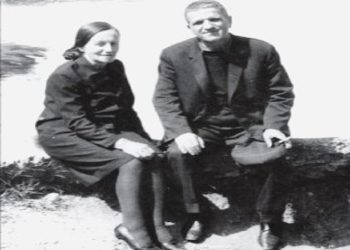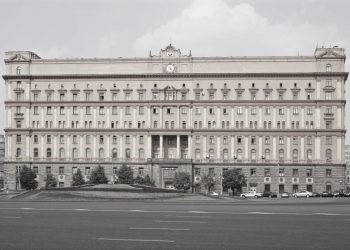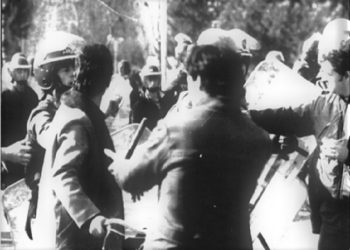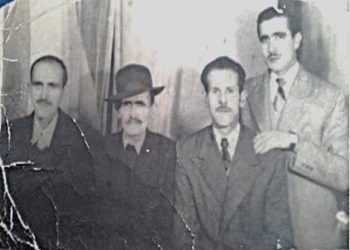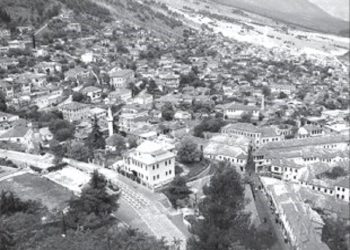Dashnor Kaloçi
Part seven
Memorie.al publishes a voluminous archival file issued by the institution of the Authority for Information of Former State Security Files, where there are hundreds of documents with the logo “Top secret” belonging to the former political prisoner, Xhavit Qesja, originally from the city of Kruja, whose family during the period of occupation of the country, 1939-1944, was closely associated with the Anti-Fascist Movement, being one of its main bases and made available all the wealth it had, as Xhavit was one of the first members of the Albanian Communist Party for the Kruja district, leading the Kruja-Ishëm partisan battalion and the 22nd Assault Brigade. Xhavit Qese’s political career after the end of the War, where he was appointed and served in senior positions in the Albanian Army, the apparatus of the Central Committee of the ALP, and several districts of the country, from where he was sent to study in the Soviet Union, where stayed until 1957, when he was announced to return to Albania urgently, after openly expressing his views in favor of the political line followed by the main Kremlin leader, Nikita Khrushchev, condemning the Stalin cult. Enver Hoxha’s conversation with Xhavit Qesen in his office in the Central Committee, where he sharply criticized him for the wrong views he had shown during his studies in Moscow, urging him to reflect and make self-criticism, but Xhavit rejected the suggestion of the first secretary of the Albanian Labor Party, which caused him to no longer be allowed to go to the Soviet Union to complete his studies, but to be sent to work as deputy chairman of the Elbasan Executive Committee, from where a year later, he was expelled from the Party and exiled to Zvërnec Island, where the communist regime kept isolated some of the former senior party and state cadres whom he had condemned for their anti-party views. Xhavit Qes’ long ordeal and persecution from 1957 to 1990, where he spent a full 32 years in prison and internment, being one of the few Burrel prison convicts to go on long hunger strikes in protest of the treatment and savage attitude of the communist regime of Enver Hoxha towards him. The complete form, investigative and judicial file in charge of Xhavit Qeses, which is published for the first time by Memorie.al, which contains the documents of the former State Security that reflect the prosecution and wiretapping against him, the reports of Security collaborators with pseudonyms their correspondence with the letters he sent to the highest party and state instances, as well as the highest leaders of the ALP, until 1991 when he was released from prison!
Continued from the previous issue
Information of the Lieutenant of the State Security, Taqo Piluri, regarding the surveillance and interception of Xhevit Qeses
I N F O R M A T I O N
On 28 / V / 58 in the evening around 21.30 met Xhavit Qesja, Angji Faberi and Ahmet _______ who has recently come from France, they were in the Tourism Garden, sitting at a table and all three are talking, they stayed until 11.30pm and then dual from there, sat for a while at the counter talking and then parted.
Elbasan 29 / V / 58
N / Lieutenant (Taqo Piluri)
Report-information of the Lieutenant Colonel of the State Security, Shim Kolli, with the data of the Security collaborator, with the nickname “Applicant”, regarding the pursuit and surveillance of Xhevit Qeses
Received from Lieutenant Colonel Shim Kolli Given by the collaborator (“Submission”)
Dated 11 / V / 1958
R E P O R T
In the previous information I forgot to mention the following. Comrade Koço Tashko, when he came to Elbasan, he met Xhavit Qesen, they even went by car to comrade Koço, in Tirana I told Xhavit to take me to Tirana, after I knew comrade Koço, but I did not I know, they did not take me. Xhavit for Koço Tashko, told me that he treats him well, i.e., that he has consideration for Xhavit.
I know from the past that Koço Tashko had an affair with Sejfulla Malëshova, even the latter came at night to the house of his friend Koço Tashko.
In the last conversation I had with Xhavit in the summer cafe above the Park Hotel, he told me:
It is a great misfortune for the Albanian communists that the 72-page booklet “Paris Commune” has not been translated! For the first time I hear Xhavit talk to me about this work. His entire conversation about the ‘Paris Commune’ took place in order to justify the Yugoslav Communist League’s program. The work ‘Paris Commune’ was erected, summarizing it, he told me that he would give me the synopsis when he had finished it.
The way of administration during the days he lived ‘Commune of Paris’, he considered as the most regular form and expressed regret, a pity that he did not live long, of course the communists, so they should think, then Xhavit began to make some comparisons, how the state apparatus functioned, in the time of the Paris Commune and as in the time of Stalin. Here he took out the face of the revisionist, began to tell me that during the existence of the Paris Commune, Ministers were elected by workers, for example, the Minister of Construction became a construction worker, but his salary was as much as that of a skilled worker. Xhavit does not consider the form of salary regular, the salary that our ministers receive, they call this, as a step towards socialism, careerism, Xhavit thinks that in our system, careerism and servility influence and that this form was adopted by Stalin’s leadership.
During the existence of the Paris Commune as after Xhavit, there was no central police, but the regional police, this explains that the public service was performed by the workers themselves, wherever they were, in factories, offices, etc. Whereas in today’s organization of the police (in our country), he thinks that the police serve not only to protect socialist property. He says all this as an introduction and then passes the conversation to the Yugoslavs.
He says that if we look at what is being said about the Yugoslavs, I could think so, but that things are not so he speaks (drowned), that in Yugoslavia, Socialism continues to be built as after the Paris Commune, that our press dance does not speak right, and B.S. kept in touch with the Yugoslavs and brought me the example that comrades Khrushchev and Voroshlov had sent to Tito on his birthday congratulatory telegram.
He therefore began to speak in order to discredit the policies and attitudes of the communist and workers’ parties. As for the Yugoslavs, he told me that there had been great zigzags between the camp and Yugoslavia, referring to 1948, what had been said about Yugoslavia at the time, how they withdrew on the occasion of Comrade Khrushchev’s visit to Yugoslavia, and what ‘has been said in 1948, they are right.
Xhaviti tells me that: “The Chinese today are coming out with a flag in hand, they do this to cover up mistakes, they had big mistakes before 1948, now they are removed as if only they defend the interests of Socialism”, and left the conversation.
Regarding Nehrun:
He said that these zigzags are making fun of personalities like Nehru and brought the example that Nehru, when he was in Moscow, had said about sincere cooperation between the states but after asking Nehru, why the Soviet Union interfered in the internal affairs of the peoples and parties? In a speech after asking why the Soviet Union interfered in the internal affairs of Yugoslavia.
In order for what Nehru said to be understood as the word of a great personality, he started talking to me about a book that after Nehru did, Xhavit called it the “Famous Book” of Nehru, which this book was recommended to you for to study it at the Moscow Party School.
He told me another thing, that this is how the world mocks us as if in our relations with Yugoslavia, as if Nehru spoke in a speech about the presidency of the League of Yugoslav Communists, Nehru in contempt for the Communist Party, after saying that: these Indian communist parties i sent a congratulatory telegram to the Congress of the League of Yugoslavia, wishing them success in the proceedings of this congress, but when they (the Indian Communist Party) saw the attitude of Moscow towards this congress, they made a second telegram condemning the revisionist principles. In conclusion, did Nehru mock the attitude of the Indian Communists and link this to Moscow’s intervention.
Xhavit told me this: this is how people make fun of these zigzags, then he started telling me how Comrade Khrushchev was ousted from the post of the first secretary and that the plenum meeting would reappoint him as the first secretary. In conclusion, he concluded that there are still unclear things; there is no stability (he had to say that there is no unity, this is my definition). Then he spoke to me as if a professor had asked him if Lenin’s works had been translated in Albania and that he had told him what works had been translated. The professor had told him: so, he had answered very badly, but the professor had closed it, Xhavit told me that he withdrew.
Here is how he got me this conversation:
That Lenin’s works have not been translated not only here but also in the republics of the Soviet Union and brought me as an example that until 1950 in Azerbaijan or Tajikistan, only two works of Lenin had been translated. He put this as a special policy of Stalin, at this time he spoke to Lenin-Stalin relations, he told me that Lenin in his will, made very bad characteristics of Stalin, called him arrogant, vague careerist, etc.
Negative epithets that I do not remember as he told me, told me that when Lenin was sick, Stalin had offended us severely, where it coincides he had told Lenin and he had written to friends, on the arrogant attitude of Stalin, Krupskoja, in a word, Xhavit sought to root in my opinion that since Lenin was alive, he had defined what kind of person Stalin was, so he wanted to show that the forms are Stalinist, while the Yugoslavs have the forms of the Paris Commune, when one does not pass into revisionism and in careerism.
Xhavit told me something about Kamenev, that Lenin loved him, but that Stalin then got caught up in some of Kameniev’s weaknesses, and as a result ended badly.
He told me that the Yugoslavs had published all the material in the article in the Communist magazine, that they did not hide from the people what we were saying, and that they had called for talks. These divergences, says Xhavit, that these (Yugoslavs) have their eyes open, were not afraid of the words we say to us.
Xhavit’s mouth never defined the Yugoslavs as revisionists; on the contrary he tried to condone their forms into just and Marxist.
When Comrade Pilo Peristeri was with Comrade irirjankeviç, the latter had asked him: What news do we have there from Tirana? Comrade Pilo had replied that: “The Yugoslavs organized hostile work against us in the assets of Tirana”, Comrade Çirjankovi ishte had replied: “Let them look at the mistakes, let us not burden the Yugoslavs in vain, what they do not have.” He spoke to me in mocking terms about Comrade Pilo Peristeri.
He also told me that the 20th Congress of the Communist Party of the Soviet Union has an extraordinary international significance, but alas, our party did not work properly on the materials of the XXth Congress. He was in Moscow and found out that no discussions were allowed here. But only the party was informed.
Then he told me that the Bulgarian delegation also asked to work superficially on the materials of the XXth Congress, but the Bulgarian Central Committee did not accept the conclusion of the whole Bulgarian Central Committee, boarded the plane and went to Moscow, together with the Party delegates. Bulgarian Communists held a meeting of the Central Committee in Moscow and analyzed the work in support of the decisions of the 20th Congress.
That is, according to Xhavit in our country, the decisions of the XX Congress have not been implemented. The Bulgarians lowered Comrade Velo Chervenkov.
(“Prescription”)
Task
- When the conversation takes place that our leadership is not in order, go out with __________ who he thinks should be put in leadership.
- Conversation on the sentence of Tuk and Bedri, telling him that he received this news in Tirana.
Elbasan on 12 / VI / 1958 (N / Colonel Shim Kolli)
Information report of the State Security Worker, Captain Avni Mehmeti, with the data of the Security man, Xhaferr Mema, regarding the pursuit and surveillance of Xhavit Qeses!
Received from Operational Workshop Given by M.P. (Xhafer Mema)
Captain (Avni Mehmeti) Elbasan on 19/6/1958
R A P O R T
The source informs that during these days I have noticed the following things about Xhavit Qesen: I see some people coming to Xhavit Qesen, whom we do not know and we have not been able to discover until now. When we asked indirectly, it is said that he was the brother-in-law. At first, a girl came to him, who was coming to his office several times, ostensibly that she came from Shkodra and broke the news, from the friends he had in Shkodra. So far I have not been able to find her generalities. Here from Elbasan I see that you come a lot, Chief of Plan Kom. Ex. District, Angji Faber.
Entering and leaving behind closed doors in his office, he does with Selman Dede, Mynever Zaimi, Thoma Tezha, Ylber Dakli and Dhimitër Haxhinikolla, although with some of the latter, he also has a working relationship, as they are in charge of sectors and he himself he has them under his patronage, I see that Mehmet Dylgjer is very guarded and they make way for him, it seems to me that he does not quarrel with him, but who knows what he thinks. He tries to get a job for himself, to go to Durrës. He does not walk a lot on the streets during the day, he likes to walk in the morning and at night, he stays in the office for a long time to read ostensibly, but in my opinion, he opens the radio in his office and listens to foreign stations. Memorie.al
(Xhafer Mema)
Office
NOTE: We did not give you the assignment
Operational Workshop
Captain (Avni Mehmeti)
The next issue follows




